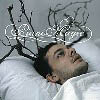 Fortunately, the title of Piano Magic's new album is not indicative of the music. There is a certain coldness and calculation to Glen Johnson's ensemble but it does not quite approach disaffection. Part of the album's chill is due to the explicit motif of ghosts and spectral images which cuts across both the music and the liner notes.
Fortunately, the title of Piano Magic's new album is not indicative of the music. There is a certain coldness and calculation to Glen Johnson's ensemble but it does not quite approach disaffection. Part of the album's chill is due to the explicit motif of ghosts and spectral images which cuts across both the music and the liner notes.
The album's insert is filled with negative photographic images, giving the impression of looking across some dimensional boundary into another plane of existence. On the cover there is the moderately disturbing photograph of a man's head lying in bed as if asleep or, more likely, dead. Tree branches emanate from the top of his skull like antlers. The whole scene is awash in grayness and the antiseptic bed linens and death-stare give the aura of an open-casket wake. The songs themselves are a mixture of two very different sounds found on the last two Piano Magic albums: the first one is found on Writers Without Homes and it is a post-rock big band sound which doesn't mesh well with my conception of the band as an electronically eerie and spacious outfit. The second sound is from the more recent The Troubled Sleep of Piano Magic and it returns Piano Magic to an electronically-assisted and vacuous moodiness which is more consistent with the band's roots. I am not very fond of this first type of Piano Magic sound. "You Can Hear the Room," the album's opener, is an example of the former sound. It begins humbly but metastasizes into some gargantuan full band jam by the end. There is no space for the ghosts to inhabit the notes even though the lyrics tend to suggest that the song is in line with the album's central conceit. The first half of Disaffected is replete with this sound. Guest vocalist John Grant of The Czars has his obligatory appearance and continues his droll infection and inflection of Johnson's songs, twisting them into something hard to listen to rather than something pleasant. I find this second type of Piano Magic sound much more agreeable. "The Theory of Ghosts" is a prime example of this sound. You can simply feel the emptiness and space which haunts the music. The song is also the epitomic example of where less truly is more. Careful tunesmithing replaces crowded instrumentation and the eastern-sounding string work is a beautiful arrangement ornamenting the song. Other songs which fall into this latter category are "The Nostalgist," "You Can Never Get Lost (When You've Nowhere to Go)," "Disaffected," and "Deleted Scenes." "Disaffected" is an extended and finely-crafted synth beat featuring Klima's Angele David-Guillou on vocals. A delicate acoustic guitar part bridges the first half of the song (the vocal half) with the clicky electronic jam at the end. "Deleted Scenes," on the other hand, is a thoroughly moribund and enjoyable New Order homage. "Love & Music" creates a category all of its own and doesn't fit into the dichotomy I have laid out thus far. The syncopated drum beat is, at the very least, unexpected from the band, creating almost a Bossanova sound. This alone places the song as a strong antithesis to what I consider to be Piano Magic's sound (of either the first or second variety). The lyrics are inexcusably repetitive and monotonous, crying out for an indictment of laziness on the band's part. Along the same lines, I want to like Johnson's seemingly autobiographical "I Must Leave London" (which details his forsaking of the Queen's country and his repatriation on the continent in Spain) better but it sounds exhausted and almost uninspired. Disaffected has trouble existing as one cohesive entity. In keeping too thematically with its motif, the album constantly has one foot in the land of the living and the other in the land of the dead, like a ghost unaware of its ghostliness.
samples:
Read More

